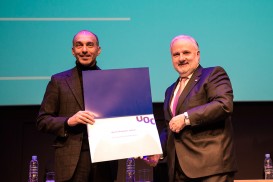Alejandro Jadad honorary doctorate by the UOC
Alejandro Jadad graduated in Medicine and went on to do a DPhil. He is now the director of the University of Toronto’s Institute for Global Health Equity and Innovation and the founder and director of eHealth Innovation at UHN, a world-leading eHealth centre in Canada. Of Lebanese descent, he was born in Colombia and studied in England. In 2001, he was described by Time magazine as one of the seven new Canadians who will transform Canada in the 21st century and, in 2007, he was named among the 10 most influential Hispanic Canadians. The UOC is to award him an honorary doctorate in recognition of his professional career, the disruptive nature of his definition of health and his worldwide contribution to health innovation. The ceremony, led by UOC President Josep A. Planell, was held on Thursday 25 January in the CCCB’s Theatre.
Jadad has revolutionized the world with a new concept of health. Is it possible to be sick and healthy at the same time? What is health? What does being healthy mean? Questions like these led the Colombian-Canadian doctor, one in a long family line, to reconsider the existing definition. Since 1948, WHO had considered health “a state of complete physical, mental and social wellbeing and not merely the absence of disease or infirmity”. Jadad, together with an international group of experts, updated it to “the capacity to adapt and cope when faced with physical, mental and social challenges”.
This was back in 2011, and this new way of perceiving health resulted in a “change in the model that influenced the overall approach to healthcare provision and how to treat patients,” explained Manuel Armayones, development director of the UOC’s eHealth Center and the person responsible for delivering the oration.
Alejandro Jadad’s professional career began in the 1990s when, while at Oxford University, he received the Overseas Research Student Award from the Committee of Vice-Chancellors and Principals of the Universities of the United Kingdom. In 2000 he founded the Red Española de Cibersalud, a Spanish cyber-health network, and the journal eSalud, the leading ehealth journal in the Spanish-speaking world.
He is also responsible for creating the most widely used tool for evaluating the quality of clinical trials worldwide: the Jadad Scale.
Maimónides Project
Recently he has focused part of his efforts on the Maimónides Project, an attempt to reinvent models regarding education, health and economics which he believes have become obsolete. His aim is to imagine a better future for humanity in harmony with the planet. Some ninety experts worldwide, leaders from the community, political, academic and corporate sectors, have identified various regions in the world which they have called islands of innovation.
The idea is to create living laboratories in which it will be possible to develop new models of life that could spread quickly throughout the world. According to Jadad, "the time has come to unleash a health pandemic” through sustainable, community-driven social innovations.
A good death
Jadad is also working to redefine the idea of a good death; in other words, the ability to decide how we want to die. Jadad has identified what factors are important to people in the final stages of life: choosing where they want to die, having autonomy when it comes to medical decisions, having the option of assisted suicide or euthanasia, avoiding unnecessary artificial measures, controlling pain and emotional suffering, allowing for religious or spiritual aspects, being with family and friends, not being a burden for others, and being aware of what is going on.
Honorary doctorate
The UOC, on the recommendation of the Faculty of Psychology and Education Sciences and the Faculty of Health Sciences, has decided to award him its highest academic distinction this Thursday, based on the following merits:
- His status as a pioneer and leader in the sphere of eHealth. eHealth Innovation at UHN, which he founded and runs, has become a leading centre worldwide in studying the use of technologies in the sphere of health – not only in terms of technology, but also in terms of healthcare and social and humanistic issues.
- His transformative vision and will as director of the Institute for Global Health Equity and Innovation, where he works to help reduce the problems of health inequality in the world.
- His disruptive leadership in helping to reformulate the concept of health as defined by WHO since 1948, towards a dynamic and all-encompassing concept that opens the door for reconsidering health policies worldwide.
- His interest and commitment to promote, support and mentor the strategies of the UOC in the sphere of eHealth, both in terms of research and teaching.
The UOC’s eHealth Center and Faculty of Health Sciences
Jadad is a member of the Advisory Board of the UOC’s eHealth Center, the first academic centre for eHealth in southern Europe. Already half-a-year old, it brings together all the knowledge generated at the University in the sphere of online health, including all the information and communication technologies aimed at promoting, maintaining and recovering health and well-being.
For the UOC’s Faculty of Health Sciences, Alejandro Jadad is considered a key figure. In the words of the dean, Pilar García Lorda, “the future of health will only make sense if it is constructed from a respect for science and evidence, but above all, if we are able to construct knowledge with and for society. This entails rethinking, reinventing and defining new models that will break away from old stereotypes. To achieve this, we must be able to take advantage of the opportunities that technology offers us in order to work towards a health that is more just, more equitable and designed to suit the needs of everyone”.
Source: UOC
